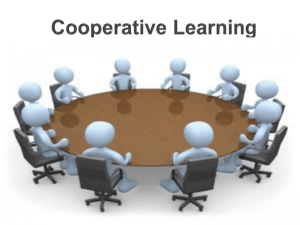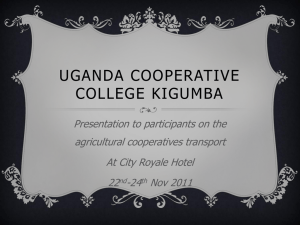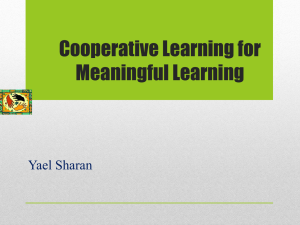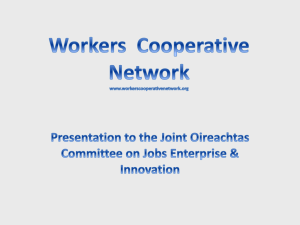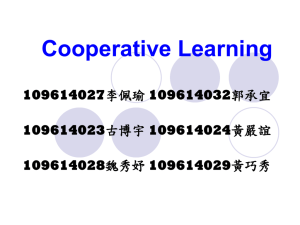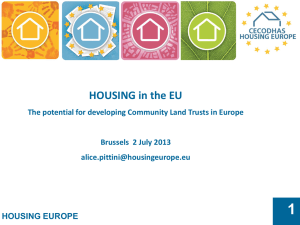Neighborhoods Mini
advertisement
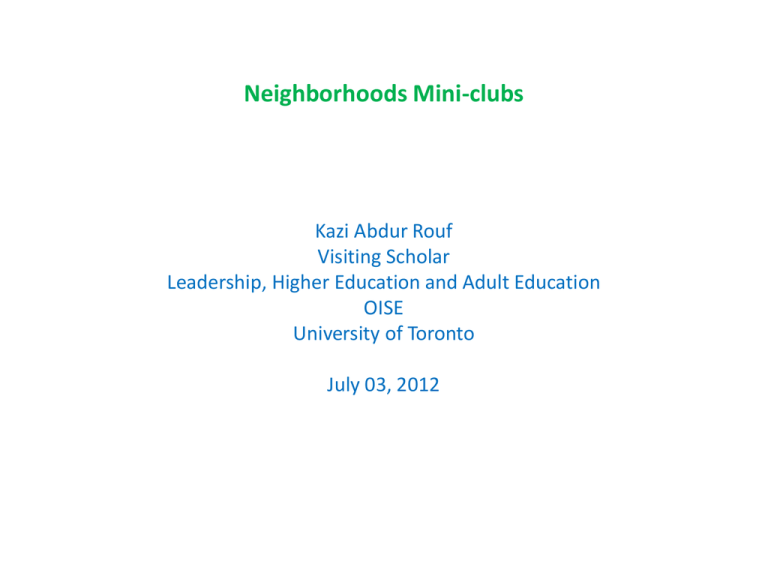
Neighborhoods Mini-clubs Kazi Abdur Rouf Visiting Scholar Leadership, Higher Education and Adult Education OISE University of Toronto July 03, 2012 Concept • Neighbourhood Mini-Club (NMC) is a mini-cooperative program for low income neighbours • To network and form groups, to develop collective behaviour and cooperative values • To facilitate thinking and forming groups • Continue to interact with group members to develop their selfesteem as well as collective esteem • To develop entrepreneurial skills, financial discipline and leaderships among members Concept continue-2 • To share information and exchange their thoughts and experiences • Exposure to different ways of incomes and to overcome poverty • Develop negotiating power • • To engage in social businesses Advantages • To free people from isolation and a monotonous life. • To help members develop partnerships to solve their problems • To think of to involve in income generating activities and engage in innovative social business projects • Co-operatives generally have twice the survival rate of other private business • Credit unions prefer lending to cooperative members • To free them from poverty. Survival rates of Co-operative businesses vs private companies Survival rate of business after…. 5 years 10 years Long term All cooperatives 64% 46% 30% Private sector companies (Statistics Canada-208 36% 20% N?A Objectives of the Neighbourhood Mini-Club Program (NMCP) • To organize and facilitate neighbourhood networking among low income people to develop cooperative behaviour and increase solidarity • To assist club members to find alternative solutions for their social and economic problems; • Connect members with local credit unions and other economic resources ; • To mobilize them to initiate and run community social and economic programs in order to reduce their poverty NMCP Services • Organize open-house sessions, create dialogue among club members to discuss benefits of social economy and social enterprises • Discuss existing types of Canadian clubs/cooperatives • Facilitate forming neighbourhood mini-clubs • Record and monitor club members activities • Facilitate members’ involvements in income generating activities, recycling businesses, and many other social businesses. • Organise and conduct trainings/workshops on moral education, miniclub management, financial literacy, managing social enterprises and small business, green development, citizen engagement, conflict resolution • Encourage graduated members (after one year) to engage in sustainable social businesses and • Connect and refer them to public resources, social services, settlement counselling services, social enterprise funds and community economic services. Importance of Neighborhoods mini-Clubs • Low income immigrants, single mothers have less interaction collaborations with their neighbours • New generations loss connections with their neighbours • Reducing collectivistic behaviours • Suffering them from isolation, a monotonous life and frustration • In Ontario “O’ dollars invest for promoting cooperative • Grassroots CO needed to organize networking among them Cooperative gap widens • Although Credit unions are increasing ; however, cooperatives development trend is decreasing in Canada For example, in Saskatchewan Numbers of co-ops decreasing 15% in 2000-2005 Membership -10% (2000- 2005 Assets -59% Revenue -62% In Ontario : Cooperatives among low income : No statistics, no record In Quebec : Cooperative growth rate is increasing (+152%) 1985-2005) Source: (Diamantopoulos, 2011) • After 2005 • Cooperative development is more decreasing in Canada • Farmers numbers are decreasing 20% in 2005-2010 in Canada (Source: (Carlton University, 2012) • 223 firms (1% of co-ops enterprises) Source: U of Wisconsin 2009. Strategy: Start with informal memberships • NMCP is facilitating group formations and connecting group members to local resources and record members activities in the community • Easy to form groups within neighborhoods informally • Get experience to continue memberships with neighbors, develop skills of accountability , respectfulness and trust each other • Avoid administrative burden of registering with Coop Acts • Develop social capital and collectivity • Gain experiences and develop leadership skills • Financial agenda after compact entrepreneurship development Structure of the NMCs • Three-five neighbours of the same sex, age group and class on a block form a neighbourhood mini-club informally • Block Centre (BC): a minimum of four mini clubs in a county • Neighbourhood Mini-Club Cluster Centre (NMCC): Three County Centers make one NMCC • Cluster Worker (CW): CW is a primary service provider to organise, facilitate and serve the club members Operation Areas • 1st year, NMCP will work in Keele and St. Clair neighbourhoods • 2nd year expand to Etobicoke South Lakeshore, Etobicoke North and Regent Park • 3rd year expand to Scarborough South, Cox Well, Scarborough Middle, Scarborough West and Melbourne area • • 4th year across GTA Challenges • The Neighbourhood mini-club (cooperative) concept is different from the traditional cooperative principles • NMC members might be reluctant to try the program without seeing an upfront economic benefit • Toronto is an advanced, industrialised, individualistic society; it would be hard to develop cooperative values among people • To get financing for the club members’ projects. Thank you Comments/Suggestions
